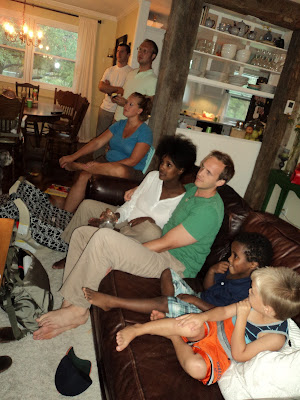I'm calling these days "Notecard Parenting." Sometimes reading things in a book makes great sense, but when push comes to shove in the moment, we often resort to the age old way of dealing with children, "Mekonen, stop touching your sister." "Mekonen, Evie doesnt' like that." "Evie, no screaming." These are merely parenting band-aids, covering up the real problem. If you don't address the real problem, the same issue will just show up another way.
So we have a few specific things we need to start working on. I chose one to start with and wrote down the specific issue and exactly how we are dealing with it on a notecard. This might sound so dumb, but hey, whatever works! I keep it on hand and throughout the day read over it to get it into my brain so its idea becomes natural in the moment. It doesn't have to be memorized word for word, but it's the concept and the training that needs to come out, "in the moment."
1. Intentionally aggravating- I don't know how many of you see this with your kids, :) but Mekonen loves to aggravate his sister. He chases her, growls at her, and just does things she doesn't particularly enjoy. Basically, it's his entertainment at her expense. All day long I can be heard saying, "Stop it Mekonen." "Mekonen leave her alone." He would obey and stop whatever it was he doing, but then a few minutes later he would choose another way of aggravating her that I hadn't yet said "stop" to. Proverbs tells us that the heart is the well spring of life. What comes out of a person is what is in their heart. This is where merely behavior management drops the ball. When you behavior modify (correct only the behavior), they continue the aggravating (sinfulness) but in another way. Our goal is to guide/train Mekonen into understanding his own sinfulness in each situation, repenting of it, and then being able to govern his own behavior instead of me always having to say stop.
So here is the specific way we are trying to guide Mekonen through these types of situations. Remember, it doesn't have to be exact. It's the need for the concepts to come to mind during an incident rather than my frustrating utterance of "Stop it Mekonen. Just leave her alone!"
This is how the training and instructing would go.
Intentionally Aggravating
Mom: Mekonen, it seems from your laughter that you're having a great time chasing Evie. Are you having fun?
Mekonen: yes?
Mom: Is Evie having as much fun as you?
Mekonen: no
Mom: What is Evie doing?
Mekonen: She's crying/yelling
Mom: Are you delighting (or being happy) in Evie's suffering? Remember, love does not delight in evil (1 Corinthians 13:6. Although I might not be quoting the verse and reference in verbatim, just referencing where the thought is coming form).
*Then at this point, Mekonen needs to ask Evie's forgiveness for making her cry.
Author Ginger Plowman used this method with her two children and she said once they did this consistently, they began to see their son able to evaluate his own heart and govern his behavior. He began to aggravate his sister and as soon as she became unhappy, he would apologize and stop the behavior on his own.
Now from here, there would be more training and instructing by way of Evie's response and the 2 of them learning to handle the conflict Biblically without tattle-taling, but that's a bit away from us now since she only knows about 5 words. :)
Notecard #1- Intentionally Aggravating
- Mekonen, it seems from your laughter that you're having a great time. Are you having fun?
- Is Evie having as much fun as you?
- What is Evie doing?
- Are you delighting (or being happy) in Evie's suffering (or sadness?) Remember, love does not delight in evil (1 Corinthians 13:6).
- Guide in asking for forgiveness and reminding him of the Gospel.
You are not loving Evie the way Jesus has loved you. Jesus loved you and fought to win you. Because of Jesus' love for you, you can love Evie. He died so that your sin of unkindness could be forgiven. We can ask Jesus to help you learn to love the way you have been loved.
Now the backside of the card isn't memorized and talked at Mekonen every single instance. It's just an example of how the Gospel is the over-arching theme of any kind of heart training. It's impractical to apply those exact words to each and every scenario, and I don't walk around reading parenting cards to my kids. But it's the concept, the idea, and allowing the Holy Spirit to lead you into those times where you continue heart training into Gospel nurturing (i.e. the specifics of the back of the card).
The Gospel aspect of parenting is the absolute foundation of any of these heart conversations. Without lacing our parenting and training with the truth and influence of the Gospel, we are in danger of teaching our children moralism.
"We are in danger of teaching them inadvertently that God is happy if they're good and say and do all the right things. We teach them that being good (at least outwardly) is the be all and end all of their faith. This is not the Gospel.When training our children and teaching them about God and His Word like He has called us to, we cannot forget the Gospel. We cannot forget the deadliness of relying on our own goodness, and we must be aware how what we say and do can teach them that Christianity is all about their behavior and whether, on any given day, God is pleased or displeased with them. Children can't use the law any more than we can, because they will respond to it the same way we do. They'll ignore it, or bend it, or obey it outwardly for selfish purposes, but this one thing is certain: they won't obey it from the heart, because they can't... That's why Jesus had to die.Does this mean we don't teach our children God's ways? We are commanded to do so but not to make them good. We are commanded to give them the law so that they will be crushed by it and see their need for a Savior. The law won't make them good. It will make them despair of ever being good enough, and in that way, it will make them open to the love, sacrifice, and welcome of their Savior, Jesus Christ." (direct and paraphrases from Give Them Grace).
Our favorite parenting books which are being laced throughout these child training and parenting posts are:
- Give Them Grace by Elyse Fitzpatrick If you only ever read one parenting book, let it be with this one.
- Shepherding a Child's Heart and Instructing a Child's Heart by Tedd Tripp
- Don't Make Me Count to Three by Ginger Plowman
- Wise Words for Moms by Ginger Plowman. This is a really great calendar size/style booklet of all these heart probing questions (where I get the notecard questions) for various issues such as lying, selfishness, aggravating others, whining, etc. You can get it for about $4. I highly recommend it. For me the notecards are easier to carry around and handle in order to memorize the "concept" rather than referring back to a booklet every time an issue arises (which would never happen for me). But that's where I'm getting the ideas from.

















































